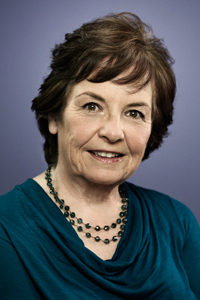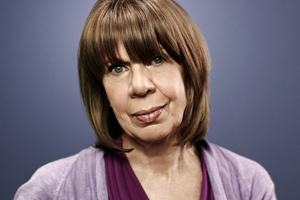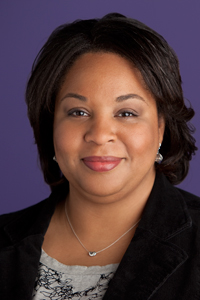Gynecologic Cancer Survivor Stories

Debra "Debbie" E.
Ovarian Cancer Survivor
Age: 59 (57 at diagnosis)
The women in my family have a history of being healthy and living a long, long time. I was the last person I thought who would ever have to worry about a major health crisis. I have a beautiful family—two sons, three stepdaughters, four grandchildren, and a supportive husband. I have always been active and enjoy outdoor sports and activities, and I guess you would say I'm a workaholic.
Before I was diagnosed with ovarian cancer, I rarely got sick. Then, a few years ago, I had some symptoms that were unusual for me—I felt bloated and gained weight for no reason I could explain. I also noticed other things that were unusual for me, like constipation, and I felt nauseous when I ate. My doctors told me I had hypothyroidism, put me on medication, and the symptoms went away temporarily. I'm still not sure if the hypothyroidism symptoms were related to what came next.
It was about a year later when the symptoms returned. And there was something new—I saw just one single spot of blood on my panti-liner. I was 57 and menopausal. I made an appointment to see my OB/GYN, something I had been religious about doing. The spot of blood reminded me it was time for a checkup.
Because of the spot of blood, my OB/GYN recommended an ultrasound and biopsy. I think the ultrasound may have saved my life because when the results were inconclusive, my OB/GYN referred me to a gynecologic oncologist, a doctor specially trained to diagnose and treat women who have cancers of the reproductive organs. The gynecologic oncologist performed laparoscopic surgery to find out whether a tumor they had discovered was cancerous. Well, I did have cancer, and I ended up having a full hysterectomy rather than just the planned laparoscopic surgery.
I was shocked and devastated to learn I had cancer and that I would need additional therapy. But about three weeks later, I began a chemotherapy regimen of six sessions, each three weeks apart. I couldn't help thinking, "What happened to the life I was enjoying just three weeks ago?"
After an emotional roller coaster that lasted for about a year following my surgery, I now feel more like my old self. And I've come to accept that while some things in life are in my control; some are not. Because of what I went through, I would like to tell other women to pay attention to their bodies. Don't get too wrapped up in your "phase of life"—like having menopause—and if you have troubling symptoms, don't dismiss them.

Eileen A.
Cervical and Uterine Cancer Survivor
Age: 67 (64 at diagnosis)
I have three children, six grandchildren, and seven great-grandchildren. They keep me busy! I also take physical activity classes offered through a local hospital, including a "Healthy Steps" class, baton twirling, and belly dancing.
In August 2007, I began having heavy bleeding and I went to a nearby medical clinic. The doctors there found that I had something suspicious on my uterus. They referred me to a gynecologist who did a biopsy, which revealed I had cancer. I was then referred to a gynecologic oncologist, who did an additional biopsy on my cervix, which also showed the presence of cancer cells. To this day, the doctors say they are not sure which came first, the uterine cancer or the cervical cancer.
I had radiation and chemotherapy. I was lucky because I didn't have any side effects from the treatment. After the radiation and chemo, I had a total hysterectomy and my ovaries were removed. I'm now cancer-free.
Today, I feel pretty good. I hope that other women will not be in denial about their risk for cancer. I had a family history of cervical and uterine cancers but I didn't get checked until I had symptoms. So if you have a family history, tell your doctor and ask if you should have special tests to find anything early. And for women with a limited income, there are programs like New York State's Cancer Services Program that can help.
Today cancer is no longer a death sentence. So don't be in denial about cancer just because you think you can't afford diagnostics and treatment if needed.

Geraldine P.
Cervical Cancer Survivor
Age: 63 (62 at diagnosis)
I've been a hairstylist for more than 35 years. I love to read and listen to music. My daughter is in the music business. I've worked in New York City for Broadway shows and for Saturday Night Live, but I was a freelance stylist when I found out I had cervical cancer. I never thought I would have cancer, but in 2009, I was diagnosed through the New York State Cancer Services Program. Because of the high cost of insurance for the self-employed, I didn't have health insurance at the time.
I went to an urgent care clinic because I was having some pain and I wanted to know what was causing it. I had not had a Pap test in recent years, so the doctor performed a Pap. It came back with suspicious findings. I qualified for additional diagnostic tests and treatment through the New York State Cancer Services Program. The clinic referred me immediately to a gynecologist at a nearby hospital. At the hospital, I had more tests, and they showed that I had cervical cancer.
I was shocked, but I didn't panic. I didn't cry. I recall feeling what I can only describe as an out-of-body experience that I will never forget. Within a few weeks of diagnosis, I began treatment that included both radiation and chemotherapy. Follow-up tests show I'm still cancer-free, and the outlook for my future is bright! I'm even back to work part-time, and I enjoy staying active.
I want to emphasize to women that it's so important to pay attention to anything out of the ordinary with your health. And get your Pap smear regularly. It really can save your life.

Tamika F.
Cervical Cancer Survivor
Age: 35 (25 at diagnosis)
When I was 25, I was living in Washington, DC, working as a television producer and loving life. I felt great and healthy, so I put off getting my routine Pap test for a few years. I thought it could wait.
When I finally did go for a check-up, I got the shock of my life. I had cervical cancer. I was devastated, and I asked myself how this was possible. I was too young and too strong for this.
My doctor recommended a radical hysterectomy, which meant I would not be able to have kids, something I had always hoped for. I searched for second opinions to understand my options. But in the end, I had the hysterectomy. I also had chemotherapy and radiation.
I was depressed, but with the support of my family and friends, I finished treatment.
Now I'm cancer-free and enjoying life! I learned just how important it is to have a Pap test regularly. If I hadn't had that Pap test that led to my cancer diagnosis, I might not be here today. I'm living proof that screening can find cervical cancer at an early stage, when treatment works best.
The Pap test actually helps prevent cervical cancer. It can find precancerous changes on the cervix that can be treated before they turn into cancer. I'm a big believer in telling women about the benefits of the Pap test. In fact, in 2005, I founded Tamika & Friends, a non-profit, community-based organization dedicated to raising awareness about cervical cancer and human papillomavirus (HPV).
I hope other women learn from my experience and make sure to have their Pap tests as recommended.
Share Your Story
If you are a survivor of cervical, ovarian, uterine, vaginal, or vulvar cancer, please consider sharing your story here. Send a note to cdcinfo@cdc.gov and we'll get in touch with you. Please include "Inside Knowledge Personal Story" in the subject line.
Contact Us:
- Centers for Disease Control and Prevention
Division of Cancer Prevention and Control
4770 Buford Hwy NE
MS K-64
Atlanta, GA 30341 - 800-CDC-INFO
(800-232-4636)
TTY: (888) 232-6348
8am–8pm ET
Monday–Friday
Closed on Holidays - cdcinfo@cdc.gov


